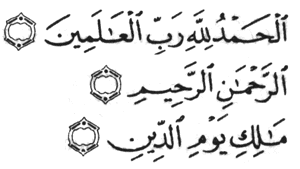All praise is due to Allaah, Lord of the Worlds and prayers and peace upon
His Messenger, Muhammad.
In this lesson we shall try to develop an understanding of some
of the characterstics of worship (ibaadah) - which begins in the heart. Thus,
this lesson is really dealing with the ‘actions of the heart’ - you
should remember what this is from the first lesson.
Ibn Taymiyyah (rh) gave the definition of worship as
follows:
"Worship is everything that Allaah loves and is
pleased with from the inward and outward sayings and actions."
In other words this is very similar to the complete and
comprehensive definition of eemaan that we dealt with in Lesson 1. This lesson
will deal with the ‘inward actions of the heart’ which really
form the basis of a Muslim’s servitude to Allaah.
As usual we shall summarise the lesson with a quotation.
Today’s quotation should be easy for everyone. It is the first few verses
of Surah Faatihah!

So what has this to do with our lecture? Lets take the verses
one by one.
1. All Praise is due to Allaah, Lord of all the
Worlds.
In this verse we praise Allaah, who is the Rabb.
‘Lord’ is a poor translation for the word ‘rabb’. Rabb
means the one who creates everything, sustains everything, owns everything -the
one who guides, misguides, gives life, takes life, shapes, fashions, sends down
the rain etc… It means that Allaah has complete power over everything.
When we understand this, we come to know, that it is Allaah who created us as
individuals, gave us life, provided us with shelter in our mother’s wombs
and outside of them. Granted us parents who looked after us and provided us with
whatever we needed, whether that was food, drink or even emotions. That Allaah
bestowed upon us many favours and gave us wealth, clothes etc…That Allaah
is continuously bestowing each of us many favours and that His favours cannot
even be enumerated. Every single breath that one of us takes, is a favour from
him etc… On top of that in times of distress, He gives us ease, in times
of poverty He gives us wealth, in times of sickness He grants us health, in
times of hunger, He gives us to eat etc… So all of this, when a Muslim
reflects over this and thinks about it carefully, should bring about a state of
the heart, which we describe as ‘Love’. Our hearts develop
‘love’ for Allaah due to all these things, that He is our Creator,
Fashioner, Provider, Sustainer, Protector, Guider, Healer etc…
From another point of view, we see that in this verse we begin
with declaring that all praise is rightfully due to Allaah. The scholars of the
Salaf (Ibn al-Qayyim, Ibn Taymiyyah, Ibn Uthaimeen and others etc.) explain that
Allaah is praised on account of his Most Beatiful Names and His
Attributes. In other words when we know that Allaah is ar-Razzaaq (the
Provider), ash-Shaafi’ (the Healer) al-Khaaliq (the Creator), al-Haadee
(the Guider) etc. then our hearts develop ‘love’ for Him. Likewise
when we know Allaah’s Attributes we come to know more about Him and
therefore our hearts develop a greater love of Him. So the fact that the verse
contains praise of Allaah, this should in turn remind us that He is praised on
account of His Names and Attributes, because they indicate his perfection and
freedom from any defects. And this in turn causes love in the hearts to
develop.
From yet another point of view, the Name of Allaah, which is
‘Allaah’ has been mentioned in the verse. And this in itself gives
indicates all the other names of Allaah. So we say, ar-Rahmaan is a name of
Allaah, and ar-Razzaaq is a name of Allaah and al-Quddoos is a name of Allaah.
So when we say Allaah, it is inclusive of all the other names of Allaah. But
this is not the case if we say ar-Rahmaan. This does not include all the other
names, likewise as-Salaam or al-Muhaimin, or ar-Raheem. These are individual
names and they in themselves, don’t represent the other names. For
example, the name ‘Allaah’ is inclusive of the meanings of all those
other names, but the meaning of al-Aleem is not the same as the meaning of
as-Samee’ or al-Baseer etc. [Refer to Ibn Uthaimeen in al-Qawaa’id
ul-Muthlaa]. Therefore the fact that Allaah is mentioned in this verse, it
reminds us of all His Names, those which He revealed and those which He did not.
And again, when we think of this, our hearts develop ‘love’ of
Him.
Some verses mentioning the love aspect of worship:
